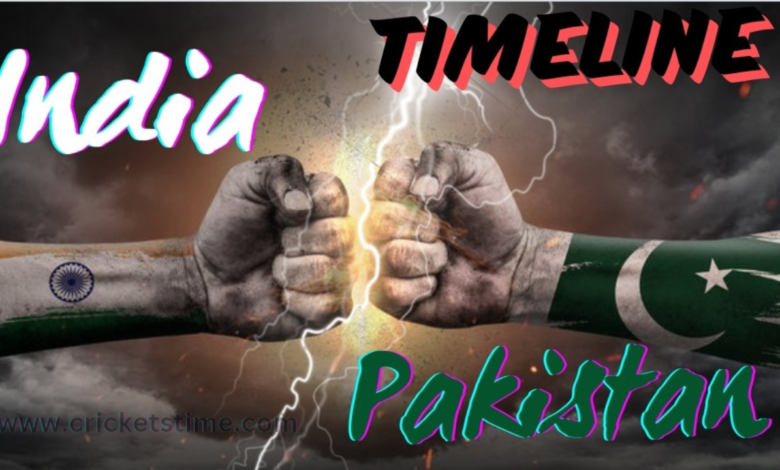India National Cricket Team vs Pakistan National Cricket Team Timeline: Historic Clashes

The rivalry between the India National Cricket Team and the Pakistan National Cricket Team is one of the most intense and storied in the history of sports. Spanning several decades, this rivalry is not just about cricket but also embodies the socio-political tensions and shared histories of the two nations. From the first match played in 1952 to the latest encounters in various formats, the India National Cricket Team vs Pakistan National Cricket Team timeline has provided fans with countless memorable moments. This article delves into the timeline of historic clashes between these two cricketing giants, highlighting key matches and moments that have defined this epic rivalry.
The Beginning: 1952-1960s
The cricket rivalry between India and Pakistan began in 1952, just five years after the partition of British India, which led to the creation of the two nations. The first-ever Test series between the two teams was played in October 1952. India, led by Lala Amarnath, hosted Pakistan for five Test matches. The series was significant as it marked Pakistan’s debut in Test cricket. India won the series 2-1, with Pakistan recording their first-ever Test victory in Lucknow. This match is a significant starting point in the India National Cricket Team vs Pakistan National Cricket Team timeline.
The 1960s saw both teams develop their cricketing prowess, but political tensions often interrupted their cricketing engagements. Matches were few and far between, but each encounter was eagerly awaited by fans. The teams played a total of six Tests in this decade, with most matches ending in draws due to the cautious approach adopted by both sides.
The 1970s: A Decade of Sporadic Encounters
The 1970s continued to be a period of sporadic encounters between the India National Cricket Team and the Pakistan National Cricket Team. The teams faced each other in just four Test matches throughout the decade, primarily due to political reasons. One of the most notable series was the 1978-79 tour, where Pakistan visited India after a gap of 17 years. The series was keenly contested, with Pakistan winning 2-0. This tour marked the resurgence of Pakistan as a formidable cricketing nation under the leadership of Asif Iqbal.
The 1980s: Intensifying Rivalry
The 1980s marked a significant intensification of the India National Cricket Team vs Pakistan National Cricket Team timeline. The decade began with the 1982-83 series in Pakistan, where the hosts won 3-0 in the Tests and 3-1 in the One Day Internationals (ODIs). The emergence of players like Imran Khan and Javed Miandad for Pakistan and Sunil Gavaskar and Kapil Dev for India added a new dimension to the rivalry.
One of the most memorable moments of the 1980s came during the 1986 Austral-Asia Cup final in Sharjah. Javed Miandad’s last-ball six off Chetan Sharma is still etched in the memory of cricket fans. This moment not only gave Pakistan a thrilling victory but also added to the folklore of the India National Cricket Team vs Pakistan National Cricket Team timeline.
The 1990s: A Decade of Dramatic Encounters
The 1990s is often regarded as the golden era of India-Pakistan cricket. This decade saw some of the most dramatic and memorable encounters between the two teams. The 1992 Cricket World Cup in Australia was the first time India and Pakistan met in a World Cup match. India emerged victorious, and this match set the tone for future World Cup encounters.
The Independence Cup in 1997, held to celebrate the 50th anniversary of India and Pakistan’s independence, was another highlight. The final, played in Dhaka, saw India chasing down a target of 315, with Sourav Ganguly and Robin Singh playing pivotal roles. This victory was significant as it showcased India’s growing confidence in chasing large totals.
The 1999 Chennai Test is another match that stands out. Despite Sachin Tendulkar’s heroic 136, Pakistan won the Test by 12 runs, showcasing the intense competition between the two teams. This match is often remembered for the sportsmanship displayed by both teams, with the Chennai crowd giving a standing ovation to the victorious Pakistani team.
The 2000s: Renewed Rivalry and Memorable Series
The early 2000s saw a temporary hiatus in bilateral cricket due to political tensions. However, the 2003 Cricket World Cup match in Centurion reignited the rivalry. India chased down Pakistan’s total of 273 with ease, thanks to a brilliant century by Sachin Tendulkar. This victory further cemented India’s dominance in World Cup encounters against Pakistan.
The 2004 India-Pakistan series, dubbed the “Friendship Series,” was a landmark event. It was the first full-fledged tour between the two nations after a gap of 14 years. The series was significant not just for cricket but also for the diplomatic thaw it represented. India won the Test series 2-1 and the ODI series 3-2, with players like Virender Sehwag and Inzamam-ul-Haq playing crucial roles. This period was a crucial part of the India National Cricket Team vs Pakistan National Cricket Team timeline, highlighting a rare phase of extensive cricketing exchange between the two countries.
The 2010s: World Cup Clashes and T20 Thrillers
The 2010s continued the tradition of thrilling encounters between India and Pakistan, particularly in ICC tournaments. The 2011 Cricket World Cup semi-final in Mohali was a high-stakes match watched by millions around the globe. India, led by MS Dhoni, defeated Pakistan to advance to the final, which they eventually won. This match was notable for the presence of the Prime Ministers of both countries, symbolizing the importance of cricket in India-Pakistan relations.
The advent of T20 cricket added a new dimension to the rivalry. The 2007 ICC T20 World Cup final saw India and Pakistan face off in a nail-biting contest. India emerged victorious, with Misbah-ul-Haq’s mistimed scoop off Joginder Sharma becoming one of the most discussed moments in cricket history. Subsequent T20 World Cup matches continued to provide thrilling finishes, keeping fans on the edge of their seats.
The 2020s: Continuing the Legacy
The 2020s have seen fewer bilateral series between India and Pakistan, but the rivalry remains as intense as ever. The two teams continue to meet in ICC tournaments, with each encounter being highly anticipated by fans. The 2021 T20 World Cup saw Pakistan defeat India for the first time in a World Cup match, breaking a long-standing jinx and adding a new chapter to the India National Cricket Team vs Pakistan National Cricket Team timeline.
Key Players and Memorable Performances
Over the decades, numerous players have left their mark on the India-Pakistan cricket rivalry. From India’s Sunil Gavaskar, Kapil Dev, Sachin Tendulkar, and Virat Kohli to Pakistan’s Imran Khan, Wasim Akram, Waqar Younis, and Shahid Afridi, these players have provided fans with unforgettable performances. Each match between the two teams has seen individual brilliance that has defined the course of the game.
Sachin Tendulkar’s performances against Pakistan are particularly noteworthy. His 98 in the 2003 World Cup and the desert storm innings in Sharjah in 1998 are among his most celebrated knocks. For Pakistan, Javed Miandad’s last-ball six in 1986 and Shahid Afridi’s blitzkrieg innings in 2014 are etched in the annals of cricket history.
Conclusion: A Rivalry Like No Other
The India National Cricket Team vs Pakistan National Cricket Team timeline is filled with historic clashes that have left an indelible mark on the cricketing world. This rivalry transcends the sport, encapsulating the hopes, passions, and emotions of millions of fans on both sides of the border. Despite the political tensions and limited bilateral series, every India-Pakistan match continues to be a marquee event, capturing the imagination of cricket enthusiasts worldwide. As the rivalry continues to evolve, it promises to deliver many more memorable moments, ensuring its place as one of the greatest sporting rivalries of all time.



